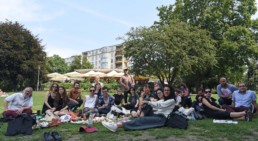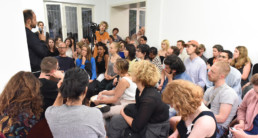Art and the Poetics of Praxis in Cognitive Capitalism
SFSIA 2018 | Berlin
Spike Art Quarterly
July 4 – 22, 2018
Faculty include: Meena Alexander, Julieta Aranda, Armen Avanessian, Sven Beckstette, Andrew Berardini, Sean Bonney, Beatriz Colomina, Mathieu Copeland, Daniel Falb, Marina Fokidis, Anke Henning, Karl Holmqvist, Yuk Hui, Isaac Julien, Marie-Luise Knott, Quinn Latimer, Raimundas Malašauskas, Warren Neidich, Olu Oguibe, Eugene Ostashevsky, Laurence A. Rickels, Cia Rinne, Georgia Sagri, Barry Schwabsky, Martha Schwendener, Tino Sehgal, Sophie Seita, Marjan Sharifi, Marcus Steinweg, Daniel Tiffany, Hans Ulrich Obrist, Hubertus von Amelunxen, John C. Welchman and John Yau.
Saas-Fee Summer Institute of Art | Berlin, 2018 is titled Art and the Poetics of Praxis in Cognitive Capitalism. The seminar will revisit pressing topics of past programs (such as estrangement and individuation) in order to consider the potential healing of a general intellect, now fragmented, dispossessed and restricted by the power of virtuality and techno-linguistic governance. As Franco Berardi has observed, the rising generation is the first to have learned more words from a machine than from their mothers; the result is —in a sense quite different from that intended by Rimbaud— an immense dérèglement de tous les sens or deregulation of signification: a break between meaning and the body. Disempathy is one result. In The Uprising, Berardi calls on poetry to revitalize and reactivate the precarious social body and reconnect a collective intelligence by way of forging singular voices and autonomous resonances. Berardi’s call to poiesis is where this year’s Institute begins.
Some thinkers (notably, Hannah Arendt) have seen a strict distinction between action (praxis) and making (poiesis). But from another point of view, the distinction becomes blurred. As Antonio Negri points out, “The work of art is always indissociably two things —incidentally, like all objects produced in the era of capitalism: it is both activity and commodity.” That is, both an intervention in the field of possibilities that is the world, and the reified by-product of an activity which, like all forms of work, involves an effort toward transformation. Poiesis is not synonymous with poetry as a literary phenomenon. Nevertheless, poetry in the broadest sense of the word is taken as exemplary of the potential for transmutation of the given, where even repetition can induce change.
Through deep readings, workshops, and performative lectures we seek to understand the power of the singular poetic voice. This voice informs us of the possibility of constructing an alternative collectivity at odds with the normalizing conditions of virtual network capitalism. How does it resonate in an expanded field of its own making and work as a model for other discourses? Can it join in chorus with feminist voices at odds with patriarchy; anticolonial voices at odds with oppression; the voices of freedom fighters engaged with the histories of racism past and present; the voices of cyber-activists exposing the contradictions of the digital world; the voice of artists gathering forms and objects to concatenate new assemblages and pathways of significations?
Our hope is to work together, through debate and participant presentations, to create an experimental platform with poetry and its production as a reference point for undertaking interdisciplinary, intersectional, epistemological adventures with the aim of emancipating the mind and the brain. We encourage inquisitive graduate and undergraduate students as well as postgraduates and independent scholars from the fields of art, architecture, critical writing, poetry, neuroscience, medicine, technology studies, critical theory, cultural studies, film and media studies, and other disciplines, to apply.
Program Overview
Progam Schedule
Public Lectures
Faculty Bios
Videos
Photos






